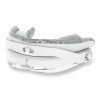Nights plagued by snoring can be a real ordeal for both the snorer and those around him or her. If this is the case, you must legitimately ask yourself the question: how can I stop snoring for good? There are a variety of solutions available to counter this phenomenon. We take you through the causes of snoring and the various alternatives available to put an end to it.
Understanding the causes of snoring
First and foremost, it's important to identify the cause of your snoring. Snoring can be the result of bad lifestyle habits, poor sleeping posture, or an illness such as sleep apnea. Naturally, we don't treat snoring in the same way in all these cases. That's why, before considering any treatment, it's important to understand the cause of your snoring.
Natural tips and advice to stop snoring
Simple lifestyle changes can sometimes be all it takes to eliminate snoring.
Change your lifestyle
- Lose weight : Excess weight, particularly around the neck, can put pressure on the airways, causing or aggravating snoring.
- Avoid alcohol: Alcohol relaxes throat muscles, increasing the risk of snoring.
- Quit smoking : Smoking can irritate the airways and increase snoring.
- Sleeping on your side: Sleeping on your back can cause the tongue to fall towards the back of the throat, narrowing the airways.
Natural remedies
- Throat exercises: Certain exercises can help strengthen throat muscles, thereby reducing snoring.
- Essential oils : Oils such as peppermint can help open up the airways.
- Change your pillow : Allergens in your bedroom and on your pillow can contribute to snoring.
Anti-snoring positioning
The position in which you sleep can have a major impact on your propensity to snore. Sleeping on your back, for example, can cause the tongue to slide back from the throat, partially blocking the airway. This can be counteracted by sleeping on your side. This is why special devices such as anti-snoring pillows or anti-snoring belts enable you to maintain a sideways position during the night, thus reducing the chances of snoring. Some of these devices can be effective in cases of sleep apnea. However, you should always seek your doctor's advice, especially if you suffer from sleep apnea.
Mandibular advancement devices
Mandibular advancement devices are oral appliances that can be very effective in reducing snoring. They work by slightly advancing the lower jaw, helping to open the airway and reduce tissue vibrations that cause snoring. Our Somnofit (and Somnofit S) anti-snoring braces use the mandibular advancement technique, and are particularly effective. This device may be indicated in cases of obstructive sleep apnea. However, we recommend that you always seek the advice of a healthcare professional.
Background treatment: effective in cases of sleep apnea
Some of the devices discussed above can be effective in treating obstructive sleep apnea, for example. However, for conditions such as sleep apnea, patients are often prescribed more invasive devices such as CPAP (Continuous Positive Airway Pressure). This involves a mask placed over your nose and/or mouth, which is connected to a small machine (pump) that forces air into your mouth. This device is sometimes prescribed for people who do not suffer from sleep apnea, but from severe snoring.
Surgery: when should it be used to stop snoring?
Surgery may be considered in some cases of snoring, particularly when there are anatomical abnormalities contributing to the problem. Common procedures include uvulopalatopharyngoplasty (UPPP), which removes excess tissue from the throat, and genioglossus advancement, which advances the tongue to prevent it from obstructing the airway. Nasal septum surgery can correct deviations in the septum, facilitating breathing and reducing snoring. These procedures require careful evaluation by an ENT specialist or sleep specialist, and certainty as to the cause of the snoring.
Conclusion: Restorative sleep restored?
The process of stopping snoring begins with an understanding of its causes, followed by an exploration of suitable solutions. It's often helpful to consult a sleep specialist, who can provide a precise diagnosis and recommend a personalized treatment plan. With the right approach, it's entirely possible to regain peaceful, restorative nights.





